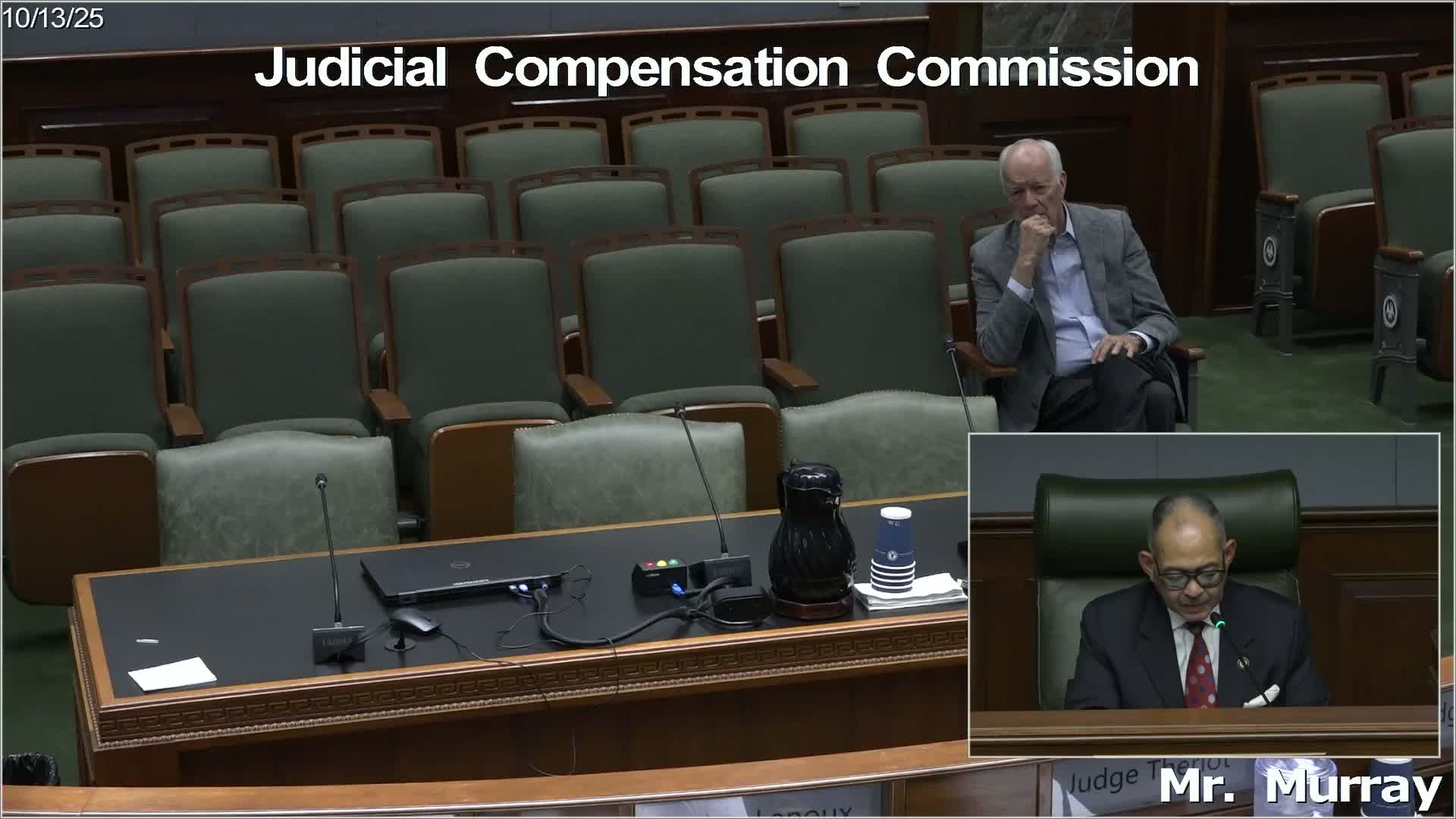Judiciary Compensation Commission votes 12-1 to authorize updated judicial pay study
Get AI-powered insights, summaries, and transcripts
Subscribe
Summary
The Judiciary Compensation Commission voted to ask economist Lawrence Scott to update a study of judges' pay, including comparisons with other states and retirement contributions; the commission set a statutory deadline for any 2026 recommendations and discussed inclusion of Board of Tax Appeals pay.
The Judiciary Compensation Commission voted 12-1 on Oct. 15 to authorize an updated study of judicial compensation by economist Lawrence Scott, a step commissioners said is needed before making formal 2026 recommendations to the Legislature.
The vote follows a presentation and discussion about judicial purchasing power, supplemental pay and retirement contributions. The commission, a 15-member body, must submit recommendations to the Legislature "no later than 01/07/2026," Robert Harper, the commission's staff attorney, told the group.
The motion to commission the update carried after a roll call that recorded 12 yeas and 1 nay; Commissioner Ralph McCallister cast the lone dissent. The roll call and tally were read aloud and entered in the record.
Why it matters: commissioners repeatedly said an updated, documented comparison of judicial base salary, supplemental compensation and retirement contributions is necessary to inform the Legislature. Economist Lawrence Scott told the commission that, by his measure, "the judges today are being paid less in real money or in real terms of purchasing power than they were in 1983." He told commissioners the 2024 change that provided a one-time payment did not restore judges' salary purchasing power because it was a bonus rather than a permanent salary increase.
Scott described the scope he typically uses: inflation-adjusted comparisons to prior years, peer comparisons with Southern states and national averages, and analysis of retirement payments. He told commissioners the 2024 lump-sum supplement he previously reported equaled "$14,691" for a general trial court judge.
Commission discussion focused on what should be included in the updated analysis. Several members asked Scott to account for supplemental and longevity pay and to note where other states’ published salary figures omit supplements. Justice Cade Cole, introduced as a member of the Louisiana Supreme Court, said the supplemental compensation "is part and parcel" of what Louisiana reports and urged care in comparing states where supplements may not be reported the same way.
Members also discussed work‑measurement data the Supreme Court said will be available later this year. Justice Cole and other speakers described an updated work‑point (workload) study being completed by the court; Justice Cole said the national center "praised the response rate" and that an updated work‑point formula is expected this year but may not be fully granularized to individual courts before the commission's statutory deadline.
The commission also discussed the Board of Tax Appeals (BTA). Judge Lisa Woodruff White, who serves on the BTA, told commissioners the board is a constitutional tax tribunal that hears state and local tax disputes and that the 2024 statute change made the commission responsible for analyzing BTA member pay as well. Several commissioners questioned whether BTA positions — which can permit outside practice and are effectively part time for some members — should be treated the same as full‑time judges; the commission concluded the statute requires the BTA be included in the study.
The commission voted to ask Scott to update his prior report, with members noting the courts historically pay for Scott’s work through judicial association dues rather than the state general fund. Commissioners also asked Scott to check whether lawyer wage data is available from the Louisiana Workforce Commission or other sources to support peer comparisons; Scott said he would check availability but warned such data for attorneys is often limited.
The commission approved the minutes from its previous meeting earlier in the session and set its next meeting for Dec. 8 at 1:30 p.m. at the State Capitol. With no further business, the commission adjourned.
Ending note: The commission’s authorization requires Scott to return with updated findings so members can form recommendations for the 2026 legislative session by the statutory deadline the commission cited.
